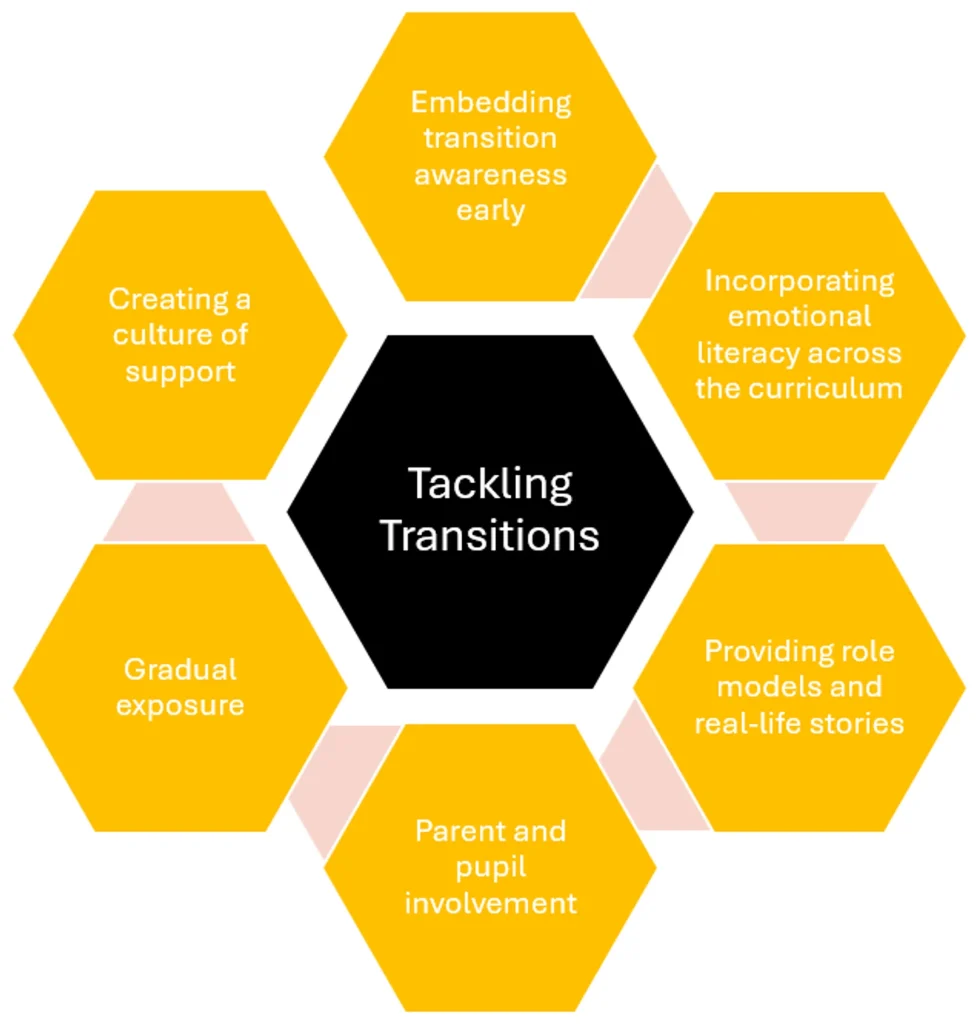Nicole Guy
Great Heights Partner Provision
Nicole Guy is a Personal Development and Wellbeing Coach at Great Heights Partner Provision.
Great Heights Partner Provision provides a high quality alternative education for children and young people with health (including social, emotional and mental health) or medical needs. The provision is available for all children of compulsory school age residing in the Kirklees Local Authority area who cannot attend school because of illness and health needs. They work closely with mainstream schools to ensure pupils are provided with the same opportunities and education as their peers.
Transition in education is one of the most pivotal experiences in a young person’s journey. It is not simply about moving from one academic stage to another; rather, it is about ensuring that students feel safe, supported, and nurtured through these changes.
We might distinguish between ordinarily available transitions and enhanced transitions.
Ordinarily available transitions refers to the processes and support provided to all pupils during key transitions. This type of transition is usually part of the regular framework and support mechanisms that schools offer to ensure a smooth progression for all students.
Enhanced transitions refers to the additional expectations on schools and providers for pupils who may require additional support. For the pupils at Great Heights Partner Provision, this refers to our individualised approach that focuses on helping young people develop resilience, confidence, and a sense of identity.
Transitions, particularly from primary to secondary school and from secondary to post-16 education are crucial milestones that shape a student’s academic and personal development. For many young learners, the absence of a well-supported transition can result in feelings of isolation, anxiety, and disconnection and this is only heightened for pupils who may have SEMH or other medical needs. If we think about our current year 11s, they missed a structured transition due to COVID-19 and many have struggled. They lost the crucial early secondary experiences that help build security and self-belie
At Partner Provision, we use a holistic, graduated approach that focuses on the individual needs of each learner. The coaching model we implement helps students explore their fears, barriers, and self-beliefs. Through psycho-education, we work on uncovering and strengthening their innate resilience.
Human beings are hardwired to resist change — our very biology, down to the 35 trillion cells in our bodies, prefers comfort and stability. Understanding this resistance allows us to help students build the necessary tools to cope with transition. This includes:
Self-awareness:: Understanding their emotions, fears, and the science behind change.
Identity development: Recognising their own strengths and values.
Building coping mechanisms: Creating a toolkit of strategies that work for them.
Family involvement: Supporting not just the student but their family, who often share their anxieties about change.
Gradual exposure: Ensuring transitions happen in a step-by-step manner, reducing fear and resistance.
To help young people visualise transition, we often use the metaphor of a sunflower’s growth; wee explore this through the planting of actual seeds. Just as a sunflower starts as a small seed in a tiny pot, a student begins their journey in a safe, familiar environment. As the sunflower grows, its roots strengthen, and it requires more space — a bigger pot. However, moving it to a larger pot is a delicate process, requiring careful support to ensure the roots are not damaged.
Similarly, young people need structured support when transitioning. If they are nurtured, given stability, and gradually exposed to new environments, they will not only survive but thrive. Through this approach, students begin to see transition as an opportunity for growth rather than something to fear.
Getting this right is hard. The needs of our pupils are complex and the nature of alternative provision means that we are able to provide this personalised support. So what do we I think are some of the key elements that can also be applied in mainstream settings?

Education is not just about academic achievement — it is about preparing young people for life’s transitions with confidence and resilience. By taking a nurturing, individualised approach to transition, we can help students move beyond fear and into a mindset of growth. With the right support, guidance, and understanding, we can transform transition from a period of anxiety into a powerful opportunity for self-discovery and success.